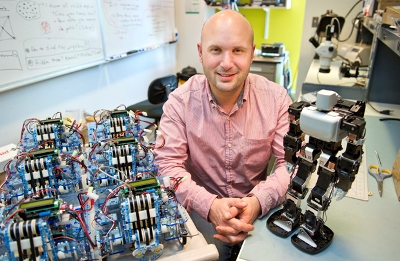Following the achievement of a National Science Foundation (NSF) CAREER Award, an assistant professor Marsette Vona, from the College of Computer and Information Science at Northeastern has intended to develop a robotic software by integrating 3-D perception and compliant contact.
 Backed by an NSF CAREER Award, Marsette Vona plans to design a robot that can adapt to an uncertain environment. Photo by Mary Knox Merrill.
Backed by an NSF CAREER Award, Marsette Vona plans to design a robot that can adapt to an uncertain environment. Photo by Mary Knox Merrill.
The objective of this software development is to equip the robot with 3-D information about its environment, followed by data processing that will result in better environmental approach with a certain level of intelligence.
At the MIT Media Lab, Vona has already designed a climbing robot, capable of attaching to uneven surfaces with adjustable grip. By following the dynamics of its initial contact, the robot will subsequently perform its specific function. The climbing robot and the recent compliant machines were not provided with cameras.
Previously, 2-D cameras were used in this technique for virtual compilation of the data. The Microsoft Kinnect 3-D camera will provide more efficiency in determining the distance of the environment that will allow its integration with compliant contact. Mystifications about locations and uneven terrain will therefore be clearly-defined in addition to determining the location and handing of structures.
Vona believes that in the near future, robots may enable amputees to move across rocky trails and perform intricate operations in nuclear reactors surrounded by debris, or dive through sea floor, or even travel on the surface of another planet. In fact, robots may prove useful to locate victims during devastations and in hazardous environments where humans cannot operate.